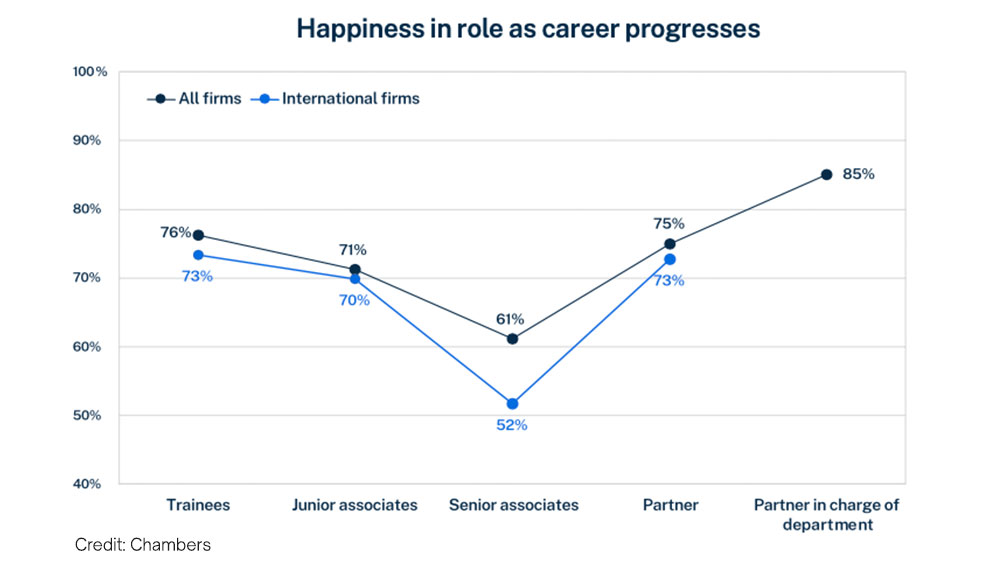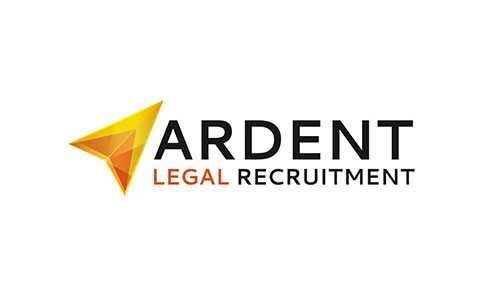Senior associates are the least happy lawyers, new data shows

Senior associates report significantly lower job satisfaction than any other fee-earner group, with only 61% describing themselves as happy.
The research of lawyers at the UK's top law firms highlights major differences in stress, hours and retention drivers across national, international and US firms.
Senior associates are now the unhappiest cohort inside UK law firms, according to new research by Chambers. While trainees, partners and department heads all reported high satisfaction levels, only 61% of senior associates said the same.
The report, which surveyed 1,680 lawyers across 110 national, international and US firms, also found that two in five associates do not expect to stay at their current firm for more than five years - a warning sign for firms already facing retention pressures.
The happiness dip
Trainees remain the most upbeat group, with around 76% reporting they are happy in their roles. But this starts to drop off after qualification. By senior associate stage, only 61% of senior associates report high levels of happiness, falling further to 52% for those at international firms.

After that, things start to look up. Lawyers at partner-level are back to trainee level happiness levels, and those that make it to department head are happiest of all.
Pay and pressure points
The survey highlights clear fault lines across different types of firms. Associates at national firms were most likely to cite salary as their biggest concern, while associates at US firms in the UK are more satisfied with the financial rewards and development opportunities, but less so with their work-life balance.
International firms were caught in the middle - they compete with US firms for work and talent, but often can’t offer the same financial rewards.
The hours problem
Associates at US and international firms reported working similar hours, around 46 hours per week, though associates at international firms were twice as likely to say the hours are too high. Lawyers at national and regional firms reported working six fewer hours each week on average than their counterparts at international and US firms.
Associates at US firms spend more time in the actual office, likely due to stricter office attendance mandates. They are also less likely to feel they can take leave and ultimately, take less of it.
Stress 'unmanageable'
Wellbeing remains one of the biggest red flags in the survey. More than half of associates (55%) said their stress levels were unmanageable. Those who said they were better able to cope were significantly more likely to feel that partners supported their development and that they received effective mentoring.
Who's leaving, and why
Associates at international firms are the most likely to leave soon and are almost twice as likely to plan an exit within two years compared to those at regional or US firms.
Retention drivers also differ sharply by firm type. Associates at regional and national firms prioritise better pay and clearer leadership. Those at international firms point to improved work life balance. Associates at US firms focus on whether partnership feels realistically within reach.
Where they want to go
For associates currently working at international firms, the five firms most likely to attract them were Bird & Bird, Kirkland, Latham, Clifford Chance and A&O Shearman - with career platform, reputation and benefits cited as the strongest pull factors.
Associates currently at US firms showed slightly different preferences, naming Latham, Paul Weiss, Kirkland, A&O Shearman and White & Case as the most appealing next steps. Their top motivators were reputation, platform and benefits.
Join 10,000+ City law professionals who start their day with our newsletter.
The essential read for commercially aware lawyers.







